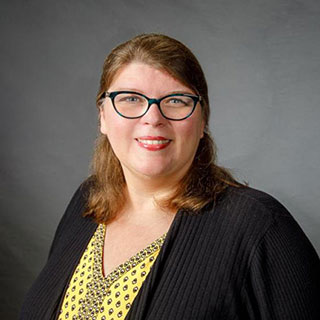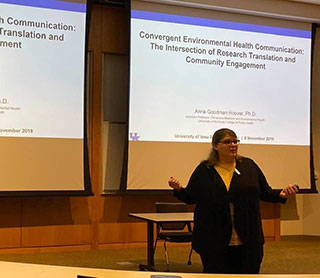March 30, 2020

Anna Goodman Hoover, Ph.D., works with residents in Appalachian Kentucky to understand what they know, and need to know, about water quality issues in the region. Hoover, an assistant professor in the department of preventive medicine and environmental health at the University of Kentucky (UK), says that providing residents with useful information to protect their health first requires understanding their knowledge and perceptions of water-related issues.
“In Appalachian Eastern Kentucky, water quality is among the chief environmental health concerns, with residents experiencing higher numbers of drinking water violations than in other Kentucky counties,” explained Hoover. “The region also is home to well-documented disparities in chronic health conditions that have been linked to environmental contaminants.”
Hoover was awarded a pilot grant from the NIEHS-funded UK Center for Appalachian Research in Environmental Sciences (UK-CARES) to develop a survey to assess Appalachian Kentuckians’ water-related environmental health literacy. The survey responses will help her better understand what motivates people to take health protective action and what kinds of messages resonate with different stakeholders. Her goal is to develop a validated tool to assess environmental health literacy that is case-specific to water quality in rural Appalachian communities.
Hoover engages two groups of water stakeholders in eastern Kentucky – watershed volunteers and water utilities workers – to find out what people need to know to understand risks and protect themselves from contaminants in the water.
So far, Hoover and her team identified several areas of knowledge important for building water-related environmental health literacy in the region. For example, people need information about exposure pathways, potential health effects and symptoms of exposure, and how to protect themselves. Conversations with stakeholders also revealed that residents need to better understand governmental processes, such as how drinking water standards are developed, the roles and responsibilities of agency officials, and who to contact about water concerns.
One of Hoover’s overarching goals is to build teams of community members, UK scientists, and government officials to produce actionable solutions for issues faced by rural communities.

Along with the UK-CARES pilot grant, Hoover’s team received a National Library of Medicine grant to work with communities to improve information resources related to environmental health literacy in the Appalachian Kentucky region. Hoover hopes this funding will help her team test a process for improving stakeholder engagement and developing educational resources.
(Photo courtesy of Anna Goodman Hoover)
“Environmental health literacy is about community members understanding the scientific and technical information they need to make health-protective decisions. And it also is about scientists, regulators, and policymakers understanding what is and is not feasible in communities,” she explained. “The knowledge exchange goes both ways.”
UK-CARES has been a valuable resource for Hoover, who describes her affiliation with the Center as having a snowball effect on her research career.
“You keep rolling down the hill accumulating knowledge and potential collaborators in your network,” she said.
Moving forward, Hoover hopes to expand her work to look more broadly at environmental health in rural communities.


